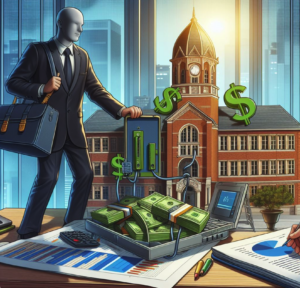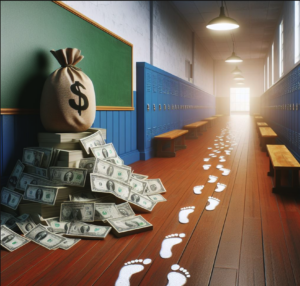Follow the money. If you are a superintendent, school board member, or principal you should follow it very closely when it comes to school safety, or you may lose control over decisions about safety in your schools.
Private investors are increasingly taking control over the school safety industry
 Private investors increasingly have their eyes set on taking over the school safety field.
Private investors increasingly have their eyes set on taking over the school safety field.
In some cases, this involves buying up smaller school safety businesses to consolidate under one single company. In other situations, it involves investors pouring money into what they believe are promising companies or ideas with the potential for growth.
Their goals? Very simple: To make private companies more profitable, make money, and then eventually sell them off for a big profit.
Historically, the school safety field has been a boutique industry of service providers. At points in time over the past three decades, there have been periodic upticks in the infusion of the security hardware, product, and technology as political and special interest forces have upped their emphasis on target hardening and physical security. These movements have been largely driven by post-school shooting government politics, grants, and funding.
In more recent years, we have seen smaller school safety companies gobbled up by businesses driven by private investors. We also see investors dumping millions into security hardware, product, and technology companies that the investors believe will flourish by capitalizing on public fears of school shootings.
During my time of more than three decades in the PreK-12 school safety field, I have never received as many calls from representatives of private investors and market analysts as I have in the past few years. Some want to hire me to give investment groups my analysis of the school safety industry to help investors guide where they spend their money. Others have asked if I am interested in selling my business. (I have declined all requests.)
Private investors typically look to invest in companies that sell, or can be reshaped to sell, products, hardware, or technology. Online platform services that are not labor/cost intensive are of interest. They look less at buying up independent consulting firms because their services are harder to turn into an easy “mass sell” to schools, unlike online platform services, security technology, or security products and hardware.
Regardless of their form or offering, in the end their goals and objectives focus on one thing: Profits.
Profit over passion?
 Follow the money, but also follow the impact on your school’s safety and security.
Follow the money, but also follow the impact on your school’s safety and security.
While individuals involved with private investment firms and the companies typically care about school safety, the bottom-line goal is financial profit for the investors. After all, investors do not spend their money with the hopes of losing it.
How do private investors impact school administrators, teachers, support staff, and students on the frontlines? In many ways, their actions and goals are less visible or even invisible to the average school principal, superintendent, or school board member.
But a few private investor influences on those on the frontlines of school safety include:
- Increased costs for school safety and security products, hardware, technology, and services. The goal is to increase financial profits. This often leads to increased prices to cover the high overhead of operating their larger businesses and to make more money. The focus of the companies may shift to increasing prices and profits, not necessarily increasing the quality or fidelity of implementation of their products or services. Unfunded or underfunded mandates created by vendor lobbying and legislative mandates impact school budgets. If not in the short-term, in the long-term school budgets bear the burden.
- Increased lobbying by the companies funded by private investors. There is a very strong and growing presence of school safety lobbyists at statehouses and at the federal level. Their goals are to create and increase taxpayer dollars for school safety grants that schools can use, often for narrowly defined purposes, which coincide with what the companies funding the lobbyists sell. While these funds provide increased revenue for the vendors, they risk locking school leaders into lengthy contracts for products and services that schools may not be able to sustain past the initial grant period.
- Increased vendor efforts to try to define and impose THEIR self-created school security “standards” upon educators. Through marketing materials, “non-profit” organizations largely driven by the vendors themselves, and other methods, school safety and security vendors are creating self-defined “standards” and recommendations that are being presented to legislators and school leaders as “standards” for school safety. The problem is that is the vendors themselves are self-creating these so-called standards and recommendations, often with token input from former educators or others but primarily shaped by the vendors. It is no surprise that these recommendations are skewed heavily to the security hardware, products, and tech services these vendors sell. School leaders need to be aware of the source of so-called “standards,” recommendations, checklists, etc. and do not accept vendor-created standards as actually being standards simply because a group of vendors said they are standards. Ultimately standards in education are created largely by those in field for which standards are created — in this case, educators and their school safety leadership identifying the school safety standards for their education contexts, not outside vendors forcing their standards upon educators so the vendors make more profits.
And the situation gets stickier when state and national “non-profit” professional associations for educators and public safety agencies are influenced by these companies through “partner” or “sponsor” money given to the associations.
When these relationships are in play, the professional associations may sign on to questionable lobbyist-driven legislation or be less likely to oppose the legislation when it hits the legislative committees. In the end, local school leaders are at risk of being stuck with bad legislation and no representation at the onset to voice implementation concerns when these laws and mandates are being created.
Advice for school leaders: Follow the money. Be critical thinkers.
 School leaders consistently tell us they are having trouble cutting through the school security vendor noise. Some are simply shutting down and tuning out. This may solve the short-term headache, but it can also adversely impact school leader decisions which, without being well thought out, could create unintended consequences and much bigger long-term headaches.
School leaders consistently tell us they are having trouble cutting through the school security vendor noise. Some are simply shutting down and tuning out. This may solve the short-term headache, but it can also adversely impact school leader decisions which, without being well thought out, could create unintended consequences and much bigger long-term headaches.
If you are a superintendent, school board member, or principal you should follow the money very closely when it comes to school safety. Locking yourself into long term contracts and initiating school security measures that you cannot sustain over the long haul may create both safety and school-community relations liabilities.
School leaders should also be pressing their state and national professional associations’ lobbying and advocacy offices to advocate for your school safety needs and interests, not those of the lobbyists for vendors.
School administrators need to be critical thinkers and strategic school safety leaders. Understanding the politics and the growing school security industrial complex influences, including the growing influences of private investors, are essential steps in doing so.
Dr. Kenneth S. Trump is President of National School Safety and Security Services
National School Safety and Security Services
Experts You Can Trust!
Connect with Dr. Ken on Linkedin: www.linkedin.com/in/kentrump/
Follow Dr. Ken on Twitter @safeschools
Visit and “Like” Our Facebook School Safety News Channel at: www.facebook.com/schoolsafety

